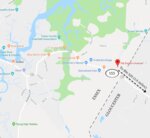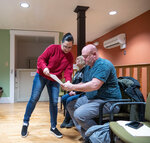

It’s been four months since the Board of Selectmen created Essex Host Community Agreement Advisory Committee of residents and public safety officials to support negotiations for a state-required “Host Community Agreement” (HCA) between the town of Essex and BB Botanics for its proposed recreational cannabis dispensary at 166 Eastern Avenue.
Last week at a joint meeting with the BOS, the committee reported its progress and initial findings. First, after a lot of research and communication with other municipalities that have successfully completed their own HCAs, the committee said the negotiation has shown that Essex should take steps to establish local zoning to clarify exactly how and where now-legal retail sales of cannabis in Essex will happen, beyond whatever happens with BB Botanics. Specifically, it would mean petitioning a new zoning bylaw at this spring’s Annual Town Meeting proposing to regulate the location of future recreational (non-medical) marijuana establishments.
Antonella Muniz, secretary for the Essex HCA advisory committee, explained the added controls are common to those cities and towns that have successfully navigated their own HCAs. She said the group had researched community agreements in other cities like Newton, Georgetown, Fall River, Malden and Brookline to research “lessons learned.” All layered some local zoning to existing state regulations for added local control. For this, the BOS were inclined to agree. “If you have licensing only through the state you lose control,” said BOS Chairman Andrew Spinney. Ruth Pereen agreed: “Upfront work,” she said, means Essex will be, “proactive instead of reactive.”
Selectman Peter Phippen said the move would alter the committee’s original charge to navigate the HCS with BB Botanics for the BOS to execute. He said a separate committee should be formed, even it if were comprised largely of HCA committee members who have amassed relevant operational knowledge on local cannabis regulations. Essex Police Chief Paul Francis said the new committee should not include a representative from public safety since it could introduce a conflict. Muniz added that from her research, this newly charged committee could work separately but in parallel to the HCA committee to optimize timing.
From there, the two groups focused back to the actual HCA agreement with BB Botanics. Members of the HCA committee told the BOS the lynchpin issue is clarity: negotiating community “impact” is really about clarifying just how much business is expected at the dispensary. And BB Botanics hasn’t provided business specifics beyond its initial public forum in September at which they told residents its business plan estimated $5 million in annual revenue from a 2,500 square foot retail site with approximately 50 parking spots. For its part, BB Botanics said it couldn’t provide details on the level of business until the Essex Planning Board tells their engineers what the size and parking are allowed under town zoning. Further, they said, the pace of the negotiation is costing them money and opportunity, as other dispensaries in Gloucester close in on their own approval.
An additional issue for BB Botianics’s plans at 166 Eastern Avenue is parking. Selectman Pereen clarified the spots allowed for a 2,500-square foot facility in Essex is 1 spot per 150 square feet of first floor retail, which would mean the site can have at least 17 parking spots by right per Essex zoning for this particular use. She encouraged BB Botanics to not wait and begin coordinating with appropriate boards, saying they’d be responsive and helpful.
Nevertheless, the HCA committee pushed, saying securing details on the dispensary’s business plan can be and should be provided to ensure a meaningful HCA. “Everything needs to fit,” said one committee member. Without clarity, there’s a potential mismatch between what is planned on paper and what is possible on the specific site.
But after some back and forth, BB Botanics acknowledged that business plan will likely not change from its original estimates provided back in September, even despite parking constraints. Instead, it said, its operational plan will adjust by securing an offsite parking site and, when necessary, bus in customers by appointment. It expects business of approximately 9,500 customers per month generating about $383,000 in revenue per month or $4.6 million per year. HCAs allow local host communities to secure up to three percent of revenues as payment (over the three percent local tax on sales) for “impact” from the establishment. Based on these estimates, Essex can secure between $138,000 and $276,000 in funds from the local dispensary.
But can the town reasonably pursue both the HCA agreement with BB Botanics while also moving ahead with a new proposed zoning bylaw to regulate how and where future cannabis retailers might operate in Essex? Muniz said based on her research, the answer is yes. In fact, she said, officials in Brookline pursued a its host agreement and baked the existence of an expected local zoning bylaw into the agreement (saying the agreement would be “subordinate” the license in the city’s bylaw.)
Besides, according to reports, the average community host agreement takes six months to develop, and the process of submitting and securing state approval for the agreement takes another eight months to one year to complete. This would build in time to receive clarification from BB Botanics on its business plan, get specifics on parking realities bring a proposed bylaw to voters at Town Meeting, requiring a two-thirds majority to pass.
The BOS took all the issues under advisement for action at its next meeting .